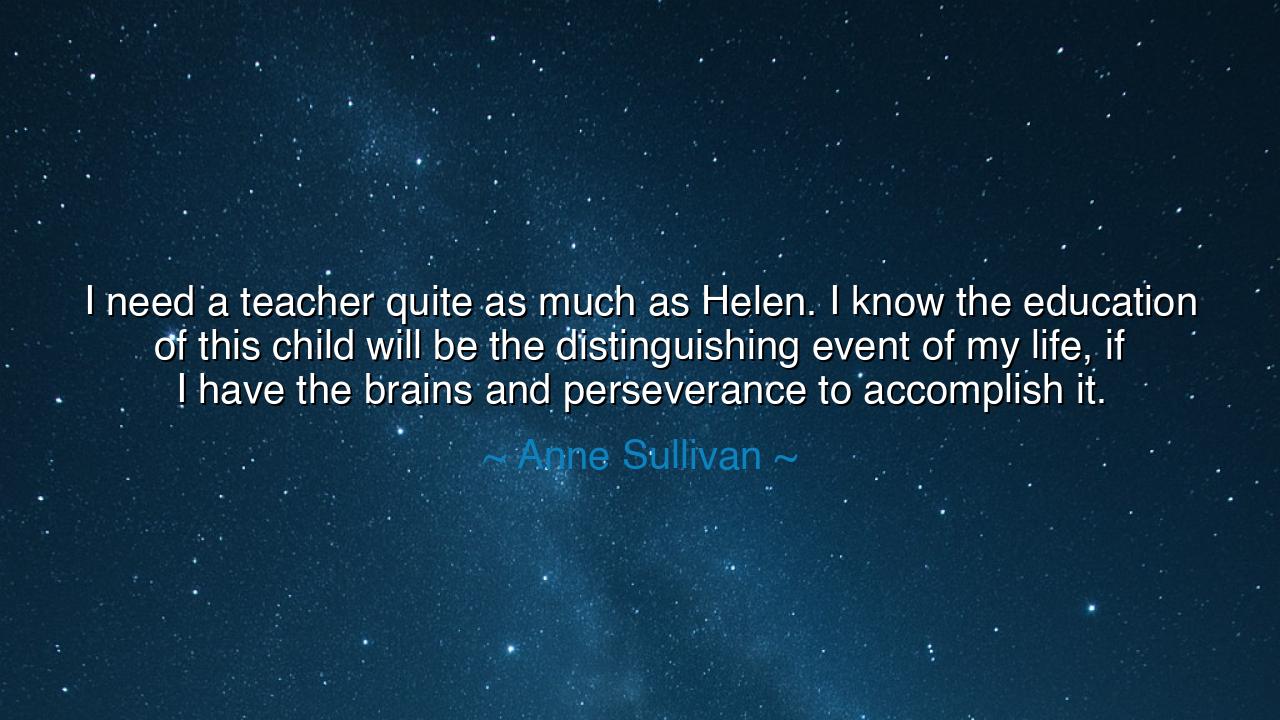
I need a teacher quite as much as Helen. I know the education of
I need a teacher quite as much as Helen. I know the education of this child will be the distinguishing event of my life, if I have the brains and perseverance to accomplish it.






The devoted and courageous Anne Sullivan, whose name shines beside that of her beloved pupil Helen Keller, once wrote these humble yet prophetic words: “I need a teacher quite as much as Helen. I know the education of this child will be the distinguishing event of my life, if I have the brains and perseverance to accomplish it.” In this confession, we see not the voice of pride, but of reverence—an awareness that to teach is not to command, but to grow alongside the one who learns. For in her words lies a universal truth: that education is not a one-way act of giving, but a shared journey of transformation between souls, where both the teacher and the student become one another’s mirrors.
To understand the depth of this quote, we must return to the story that gave it birth. Anne Sullivan, a young woman scarred by poverty, illness, and blindness, was chosen to educate Helen Keller, a child who could neither see nor hear, locked away in a world of silence and isolation. Many doubted that such a feat was even possible. Yet Sullivan, though only twenty years old, accepted this challenge not as a test of skill, but as a divine calling. She understood that her task would not only shape Helen’s destiny but also her own. Thus, when she wrote these words, she was speaking not merely of teaching but of the sacred act of learning to love, to endure, and to awaken the hidden potential within both pupil and guide.
When Sullivan said, “I need a teacher quite as much as Helen,” she revealed the humility of true greatness. She knew that to teach well, one must first be teachable. Each child, each human being, carries within them a mystery—a language of the heart that cannot be understood by books or rules. Helen Keller, in her silence, became Sullivan’s teacher. Through her, Anne learned patience beyond measure, compassion beyond reason, and the boundless possibilities of the human spirit. What began as a mission to educate a deaf and blind child became a lifelong partnership, in which both souls were refined by hardship and illuminated by love.
This bond between teacher and student is as ancient as civilization itself. The philosopher Plato learned as much from his dialogues with Socrates as he later taught to Aristotle. The exchange of wisdom between generations is not a river that flows in one direction—it is a tide that rises and falls, carrying both minds to higher shores. Anne Sullivan embodied this ancient ideal. In her humility, she became a vessel for wisdom; in her perseverance, she became its instrument. Her words remind us that education is not about authority, but about mutual discovery—that every teacher must first learn to see through the eyes of another, and every student must learn to trust the one who leads.
The story of Anne and Helen did indeed become the “distinguishing event” of Sullivan’s life. For through years of struggle, through nights of despair and days of triumph, she unlocked the world for a child once thought unreachable. When Helen first connected the feel of water on her hands to the word spelled into her palm, the floodgates of understanding burst open. From that moment, Helen Keller’s mind awakened, and with it, Sullivan’s destiny was fulfilled. The two became inseparable—Helen’s brilliance a reflection of Anne’s devotion, and Anne’s legacy a reflection of Helen’s growth. Together they proved that education, when born of love and perseverance, can overcome even the silence of darkness.
Yet Anne’s quote also reveals her awareness of human limitation. “If I have the brains and perseverance to accomplish it,” she said, recognizing that knowledge alone is not enough. The teacher’s greatest challenge is not the student’s ignorance, but their own fatigue, their doubt, their fear of failure. True education demands not only intellect but endurance, compassion, and faith. For the greatest lessons are not written on chalkboards—they are carved upon the soul through hardship, patience, and courage. Anne’s triumph came not because she knew all the answers, but because she refused to surrender to despair.
The lesson we inherit from Anne Sullivan is both simple and profound: to teach is to serve, and to serve is to learn. Whether one stands in a classroom, raises a child, or guides a friend, every act of guidance is also an act of self-discovery. Let every teacher remember that their students are their greatest lessons; let every student remember that their teachers are their fellow travelers on the road to understanding. The education of another human being is not a profession—it is a covenant, a sacred trust that can transform both hearts forever.
So let these words of Anne Sullivan echo through the ages: “I need a teacher quite as much as Helen.” For the wise know that learning never ends, and that to lead another toward light, one must walk through the shadows with them. If we, like Anne, cultivate brains to think and perseverance to endure, then we, too, may find that the greatest distinction of our lives lies not in what we achieve for ourselves, but in what we awaken in others. For in teaching, we are taught; in giving light, we become light—and that, above all, is the eternal miracle of education.






AAdministratorAdministrator
Welcome, honored guests. Please leave a comment, we will respond soon